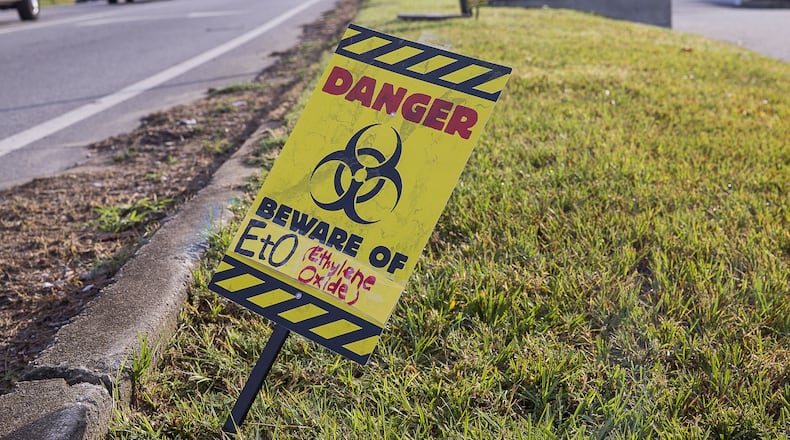Editorial note: this story has been updated with a response from Sterigenics.
Residents are raising fresh questions over the safety record of an industrial facility in Cobb County following revelations about an explosion that injured a worker there, and an unreported leak of toxic gas.
The unrelated incidents both occurred in 2018 at the Sterigenics plant on Olympic Industrial Drive near Smyrna, well before the plant's ethylene oxide emissions drew public attention for the chemical's link to cancer. The facility uses the carcinogenic gas to sterilize medical equipment.
At a meeting with county commissioners Monday, Sterigenics President Phil Macnabb acknowledged the explosion inside the plant on July 10 of that year.
“There was an immediate combustion and an employee was injured,” Macnabb said. “He’s in recovery … We’re looking forward to getting that employee back soon.”
The explosion was documented by federal labor and state environmental regulators.
According to the Environmental Protection Division’s report, Sterigenics told regulators that an employee was in the sterilization chamber “when (he) observed a small spark/flash.”
The report also said that the plant had suspended operations while the investigation took place.
But the incident was far more catastrophic than suggested by the EPD, according to a report from the Cobb County Fire Department and a former Sterigenics employee.
When Cobb firefighters responded to an alarm at the plant, a worker told them that an employee “was badly burned in an accident,” according to the report. The employee was loaded into an ambulance and taken away by first responders.
The former employee, who was at the plant that day, said the accident occurred when a coworker was preparing to use a forklift to move product out of one of the sterilization chambers. An ethylene oxide gas leak ignited, throwing the man and the forklift more than 30 feet, the employee told The Atlanta Journal-Constitution.
“His clothes were burnt off,” said the former employee of his injured colleague. The former employee asked that his name be withheld because he signed confidentiality documents.
The explosion, he said, “shook the whole building.”
“Wherever I walked I saw pieces of the ceiling on the floor,” the former employee said.
The former employee also contradicted the EPD report that said the plant shut down in the aftermath of the accident. Instead, he said, the plant manager had the forklift moved to the opposite side of the facility and operations resumed as normal.
“When he was hurt, operations were still going on,” the former employee said. “I was like, ‘We’re still turning a profit today?’ I’ve never seen that before.”
UPDATE: Sterigenics says it suspended operations after July 2018 explosion
A spokesperson from Sterigenics denied the former employee’s characterization. The spokesman said the sterilization chambers were closed for days and that the company suspended the use of ethylene oxide while the incident was investigated. He said the only functions that continued were “back-end” operations for product that was already in process and could not be halted safely, and that the incident was reported to EPD “out of an abundance of caution.”
The federal Department of Labor did not immediately responded to the AJC’s questions, and has yet to fulfill a Freedom of Information Act request for the full report about the incident.
Stop Sterigenics, a citizen group concerned about emissions and would like to see it shut down, recently obtained and publicized documents showing the company was reprimanded by the state EPD in October for failing to report a leak that occurred in April, 2018. Regulators did not take action beyond issuing a letter of reprimand.
The company initially reported 10 pounds of pure ethylene oxide had been released into the atmosphere because of a faulty pipe. The company later revised downward their estimate of gas released to 2.6 pounds.
All emissions from the plant — permitted and not — are self-reported to state regulators.
Bridget Kurt, an activist with Stop Sterigenics Georgia who lives a mile from the plant, said the company’s handling of accidents on site concerns her.
“I just wonder how much they are training their workers and how much they value their employees, and how much they value their neighbors,” she said.
READ MORE: GA's first air test shows toxic gas above acceptable level
READ MORE: State offers assurance over toxic emissions, but residents want action
READ MORE: Fear, doubt linger over toxic emissions, as regulatory battle rages
Story so far:
2016: federal regulators reclassify ethylene oxide, an industrial gas, as carcinogenic
2018: Based on this new classification, regulators flag several census tracts in Georgia as having potentially elevated risks of cancer but do not inform residents
2019: Press reports bring public attention to ethylene oxide, igniting outrage from residents. Local and state officials have pledged to conduct air testing
About the Author
Keep Reading
The Latest
Featured


